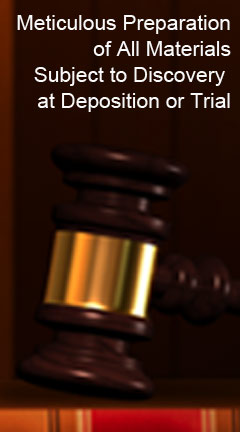Archival Notice
This is an archive page that is no longer being updated. It may contain outdated information and links may no longer function as originally intended.
Home | Glossary | Resources | Help | Course Map
It is good practice for the expert to prepare all materials as if they may be subject to discovery production. The expert should test everything he writes as if it were going to be used against him in open court. A prepared expert should determine whether he could explain or justify the contents of any discoverable memorandum, note, report or technical observation.
The expert should insist that the lawyer for whom he is acting has an opportunity to review the expert's case file before his testimony or deposition has begun. Items that are clearly privileged should be removed.
The expert should note each item removed by date, subject and recipients and deliver the list to the retaining attorney for forwarding to opposing counsel. It is then up to the opposing side to determine whether any of the items removed should be subject to further discovery proceedings and possible orders for production.
Additional Online Courses
- What Every First Responding Officer Should Know About DNA Evidence
- Collecting DNA Evidence at Property Crime Scenes
- DNA – A Prosecutor’s Practice Notebook
- Crime Scene and DNA Basics
- Laboratory Safety Programs
- DNA Amplification
- Population Genetics and Statistics
- Non-STR DNA Markers: SNPs, Y-STRs, LCN and mtDNA
- Firearms Examiner Training
- Forensic DNA Education for Law Enforcement Decisionmakers
- What Every Investigator and Evidence Technician Should Know About DNA Evidence
- Principles of Forensic DNA for Officers of the Court
- Law 101: Legal Guide for the Forensic Expert
- Laboratory Orientation and Testing of Body Fluids and Tissues
- DNA Extraction and Quantitation
- STR Data Analysis and Interpretation
- Communication Skills, Report Writing, and Courtroom Testimony
- Español for Law Enforcement
- Amplified DNA Product Separation for Forensic Analysts


